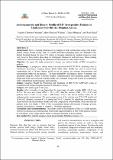| dc.description.abstract | There is lacking information on changes in body composition along with dietary pattern among People Living with HIV/AIDS (PLWHA) attending clinic at Chulaimbo Sub- district hospital, Kenya. In most HIV clinics in Kisumu, patients are weighed almost at every visit; however this practice alone does not distinguish between fat and lean mass. Hence making it difficult to understand clearly the effectiveness of treatment or other interventions. To assess the body composition changes and nutrient intake of HIV sero-positive patients. A prospective cohort study was conducted on 497 PLWHA attending clinic at Chulaimbo Sub-district hospital, Kenya. Body Mass Index (BMI) was used to assess body composition and a 24-hour dietary recall survey to capture the average macronutrient and micronutrient intake of the patients. The mean probability of adequacy across 9 nutrients was calculated using the Dietary Reference Intakes. Anthropometric data including current weight, height and BMI were collected. Nutrient intake was estimated using a diet history in combination with a standardised food frequency questionnaire. Academic Model for Prevention and Treatment of HIV/AIDS (AMPATH) clinic at Chulaimbo Sub-district hospital, Kisumu West District, Kenya. Subjects: 497 adults aged 18–60 years. After 6 months, it was found that the percentage of under weights (BMI <18.5) was 20.3%. The men were leaner (BMI = 20.5 ±3.67) than the women (BMI = 21.7 ±3.87) and patients with a CD4+ T cell count < 200 tended to have the lowest median values for all anthropometric measurements. The mean energy intake of the patients was 1574 ±578 (male) and 1636 ±621 (female), a protein 42 ±16 (male) and 39 ±12 (female). No significant correlation was found between the macronutrient intake and body composition at the baseline. More than half the patients had a low intake (< 90% of the recommended dietary allowances) of energy, protein, calcium, iron (female), vitamin A, vitamin C, riboflavin and niacin. The results confirm that majority of the HIV/AIDS patients from this population are malnourished. Nutritional supplementation of HIV/AIDS patients should be considered, as this might lead to improved immune function in these patients. | en_US |

